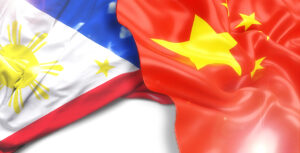
China summons Filipino envoy as Marcos lauds Taiwan leader’s election
By John Victor D. Ordoñez, Reporter
THE CHINESE Foreign Ministry has summoned the Philippine ambassador to China after President Ferdinand R. Marcos, Jr. expressed intent to work with Taiwan’s newly elected president, China’s foreign ministry said on Tuesday.
“The Chinese side is strongly dissatisfied and resolutely opposes this,” Chinese Foreign Ministry spokesperson Mao Ning told a regular news conference, referring to Mr. Marcos’ message to Taiwan president-elect William Lai Ching-te.
She said Assistant Chinese Minister Nong Rong had summoned Philippine Ambassador to China Jaime A. FlorCruz to “give the Chinese side a reasonable explanation” for the Philippine Chief Executive’s congratulatory comments to Taiwan’s new leader.
In an X post, Mr. Marcos said he looks forward to “close collaboration, strengthening mutual interests, fostering peace and ensuring prosperity for our peoples in the years ahead.”
“On behalf of the Filipino people, I congratulate President-elect Lai Ching-te on his election as Taiwan’s next president,” he said as world leaders, including US Secretary of State Antony Blinken, recognized the new Taiwanese leader.
In his response, Mr. Lai recognized the “enduring friendship” between the Philippines and Taiwan.
“I look forward to enhancing our economic and people-to-people ties while championing democracy, peace & prosperity in the region,” he said on X.
Following this exchange, the Department of Foreign Affairs (DFA) of the Philippines said Manila would remain committed to the One-China Policy.
“The Department of Foreign Affairs reaffirms the principles contained in the Joint Communique of the Government of the Republic of the Philippines and the Government of the People’s Republic of China signed by President Ferdinand E. Marcos and Premier Zhou Enlai on 9 June 1975,” the DFA said in a statement on Sunday.
Mr. Marcos’ congratulatory statement was “his way” of thanking Taiwan for hosting about 200,000 overseas Filipino workers as Manila and Taipei “share mutual interests,” the DFA said.
In a separate statement, the Chinese Foreign Ministry referred to Marcos’ remarks as “a grave violation of the one-China principle and the communiqué on the establishment of China-Philippine diplomatic relations and a breach of the Philippines’ political commitment to China.”
Earlier, China’s Taiwan Office spokesperson Chen Binhua said the elections would not “change the basic landscape and development trend of cross-Strait relations.”
Taiwan, which has been independent from China since 1949, is still seen as a “renegade province” by Beijing.
“It is important to note how Beijing has also defied diplomatic protocols many times against Manila’s interests, such as holding a surprise meeting with the former president (Rodrigo R. Duterte),” Don Mclain Gill, an international relations lecturer at De La Salle University, said in a Facebook Messenger chat.
“Therefore, there was nothing wrong with what President Marcos Jr. said,” Mr. Gill said. “Taiwan is of crucial importance to the Philippines and the Filipino people for evident commercial and socio-economic reasons.”
While the Philippines’ DFA clarified the government’s adherence to the One China Policy, he said “it is clear how Manila sought to illustrate its political autonomy while also highlighting the need for democracies to work together amidst revisionist forces in the region.”
The election of Mr. Lai followed a year that saw increased tensions in the region involving China, which also claims the South China Sea almost in its entirety.
“The election result in Taiwan is a good reminder to the Philippines on the importance of the voice of the people in fighting for national sovereignty,” Chester B. Cabalza, founder of Manila-based International Development and Security Cooperation, said via Messenger chat.
The two countries are “natural neighbors that should be backing each other amid insecurities posed by China’s aggression in the region,” he said.
Mr. Cabalza also noted that Taiwan is a South China Sea claimant and its bond with the Philippines could boost a rules-based order in one of the world’s most important waterways.
The win of a pro-democracy leader in Taiwan gives an overview of the upcoming election in the Philippines next year, he said, which should be “a referendum of our case in the West Philippine Sea.” — with a report from Kyle Aristophere T. Atienza



